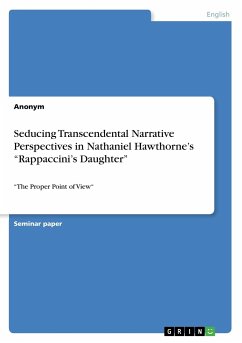Studienarbeit aus dem Jahr 2005 im Fachbereich Amerikanistik - Literatur, Note: 1,0, Johannes Gutenberg-Universität Mainz, Sprache: Deutsch, Abstract: "You must tell it in such a way that they don't know you're telling it, and that they don't know they're hearing it."Willa Cather, The Song of the LarkFirst published in her 1905 collection The Troll Garden, Willa Cather's early short stories are often described as fiction that predominantly deals with one overall grim topic: How an artist is undervalued by society, thus frustrated and finally destroyed by either his own depressions, society, or both (Carpenter 591). Those stories helped Cather, as Daiches claims, to justify her own status as a writer (146). However, "Paul's Case" is not about the bitter life of an artist; instead, I rather like to suggest that it mirrors Cather's ideas on the Bohemian lifestyle at her time and echoes her voice as a lesbian writer by revealing the strongly felt need to express a sexual deviancy that could not be expressed explicitly. As proven many years after the first publication of "Paul's Case," this text has, ironically gender-reversed, greatly contributed to the canon of male homosexual literature and thus deserves to be taken into queer account. A close reading of Paul's deviancy, I hope to prove, reflects the Bohemian ideology of Cather's time and shows that a mistreatment of deviant sexual identity is strongly in evidence. Indeed, "Paul's Case" offers its critic the possibility of various readings, a result which mainly roots in the author's profound "tension between concealment and revelation" (Stout 88). On the one hand, Cather's narrative indirection, her powerful silent rhetoric, questions the social construction of gender in her times; on the other hand, the author keeps this concern as a subtext to other motifs and thus makes it difficult to determine one overall explicit authorial statement. This circumstance makes it easy for the critic who prefers avoiding an examination of queer notions in "Paul's Case," even though this story has gradually emerged as Cather's "representative gay text" (Anders 53). One of the more ignorant analyses is that by Rob Saari who, while comparing Paul to Narcissus...
Hinweis: Dieser Artikel kann nur an eine deutsche Lieferadresse ausgeliefert werden.
Hinweis: Dieser Artikel kann nur an eine deutsche Lieferadresse ausgeliefert werden.








